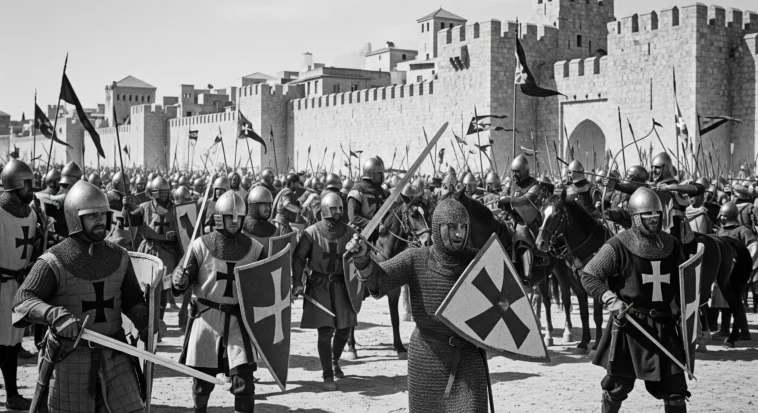
The epic battles, the booming hooves of horses, and the fierce chants of fighters weren’t just stuff of films—they were legit, and they rocked the Middle East for ages.
The Crusades, spanning from the 11th to the 15th century, were like this epic showdown between Europe and the Middle East—Christian armies rolling in after a long stretch of Muslim growth.
It was a wild, intense back-and-forth battle.
The Political Transformation: New Powers and Shifting Boundaries
The rise of the crusader states
The First Crusade dropped European mini-kingdoms right in the Middle East’s backyard—Jerusalem, Antioch, Edessa, and Tripoli.
These weren’t just military bases; they brought European feudal systems and mashed them with local governance.
It was a political remix that lasted almost 200 years, forcing Muslim rulers to level up their diplomacy and war strategies.
The Islamic response: Unity through adversity
The Crusades basically did what no one thought possible—got rival Muslim states to team up.
Enter Saladin, the legend who took back Jerusalem in 1187.
His fame? So big even a German emperor fixed up his grave centuries later.
The whole era baked the idea of jihad-as-defense deep into Islamic politics—a mindset that shaped how the Middle East later faced European colonial powers.
Economic Revolution: Trade Routes and Commercial Networks
The expansion of Mediterranean commerce
The Crusades didn’t just swing swords—they opened trade highways.
Middle Eastern cities like Aleppo, Damascus, and Acre became the ultimate pit stops for goods flowing between Europe and Asia.
Italian trading hubs like Venice and Genoa set up shop, creating a global-style marketplace centuries before globalization was a thing.
Urban development and economic growth
More trade = bigger, busier cities.
Souks expanded, new neighborhoods popped up, and merchants basically became the influencers of the day.
The Crusades also supercharged finance: moving money across continents for armies and trade led to smarter banking and credit systems, many of which Middle Eastern merchants nailed down and improved.
Basically, the Crusades turbocharged the economy and rewired how cities and commerce functioned.
Cultural Exchange: The Unexpected Bridges
Scientific and technological transfer
The Crusades weren’t just sword fights—they were knowledge raids.
Europeans ran into mind-blowing Islamic science, medicine, math, and philosophy, then brought a ton of it back home.
Sure, some European ideas trickled east, but mostly it was East → West, and this brainpower boost helped spark the European Renaissance.
Architectural fusion
Crusader castles like Krak des Chevaliers weren’t just pretty—they were a mashup of European and Islamic military tech.
Local builders soaked up European techniques, creating hybrid styles in both religious and everyday buildings.
Basically, the Crusades left a blueprint for cultural remixing that still echoes in architecture today.
Religious and Social Transformation
The hardening of religious boundaries
The Crusades weren’t just battles—they also pushed people to pick sides.
Holy war became a bigger deal in both Christianity and Islam, hardening religious identities.
Warrior-monks like the Knights Templar and Hospitallers weren’t just fighters—they ran banks and owned land, flexing serious economic power.
Social stratification and identity formation
Living through occupation, resistance, and coexistence reshaped society.
Christians, Muslims, and Jews navigated new social rules, and the idea of “protected minorities” evolved.
These conflicts also helped shape Arab, Turkish, and Kurdish identities that would matter in politics for centuries.
Basically, the Crusades rewrote who people were and how they saw each other.
Long-Term Economic Consequences
The foundation of modern trade networks
The Crusades didn’t just fight battles—they built trade highways that lasted centuries.
Merchants traded across religious lines, even during wars, laying the groundwork for the Ottoman economy and later European exploration.
Without these networks, Europe might never have sailed around Africa or “discovered” the Americas.
Banking and finance innovation
Funding armies across continents forced Italian banks to get creative with money transfers and credit systems.
Middle Eastern merchants picked up these tricks, keeping the region a major economic hub between Europe and Asia.
Basically, the Crusades turned war cash into financial brains.
The Ottoman Integration and Beyond
Eventually, the Crusader-era lands got pulled into the Ottoman Empire, and the Ottomans knew how to work what was already there.
They used the boosted trade networks, bustling cities, and hybrid governance left behind by the Crusades to run a smoother empire.
The mix of religions in these cities actually fit the Ottomans’ playbook.
Their millet system let different religious communities govern themselves while still being part of the empire—a smart way to keep diverse populations from exploding into chaos.
Basically, the Ottomans didn’t erase the Crusades’ impact—they leveled it up.
Modern Implications and Historical Memory
Contemporary political discourse
The Crusades aren’t just history—they’re still used in politics today.
Leaders bring up “Crusader” imagery whenever the West intervenes, showing how these events shaped regional identity and resistance vibes.
Even 19th-century European romanticism of the Crusades left its mark on how the Middle East sees Western attitudes.
Archaeological and cultural heritage
Castles, churches, and city layouts from the Crusades still dot the Middle East.
They’re not just tourist attractions—they’re living reminders of a wild mix of cultures and ideas that shaped the region, while also boosting modern economies.
Conclusion: A Legacy Written in Stone and Memory
Epic conflicts aside, the Crusades had a profound cultural, political, and commercial impact on the Middle East.
East-West cultural interactions created bridges that are still in use today, as borders continued to move and economies were accelerated.
Even more, these wars helped shape regional identities and memories that echo in modern Middle Eastern politics.
The takeaway? The Crusades changed how civilizations interact, trade, and even think about each other.
Even the messiest history can leave behind unexpected connections that last long after the last sword drops.



